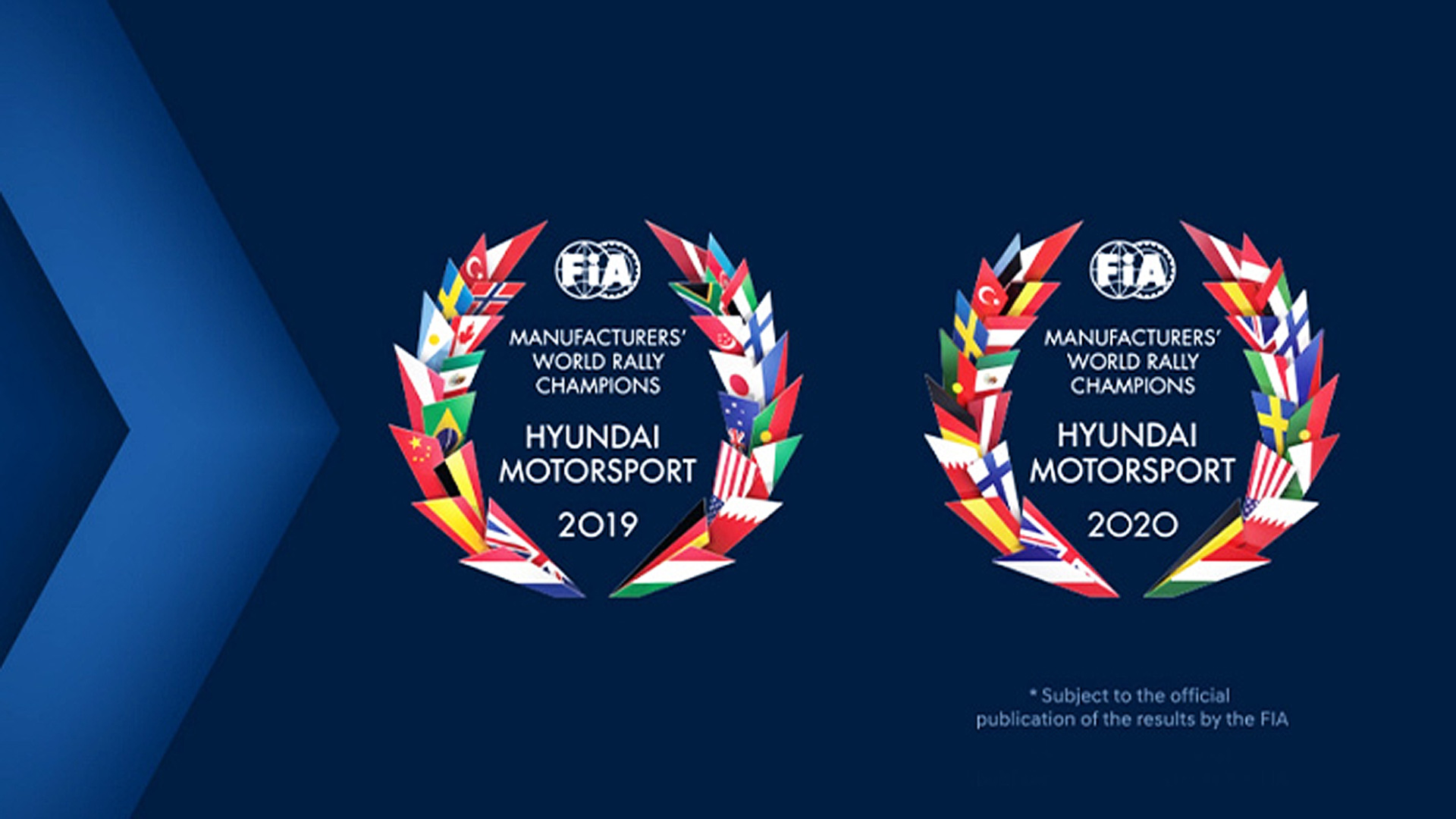
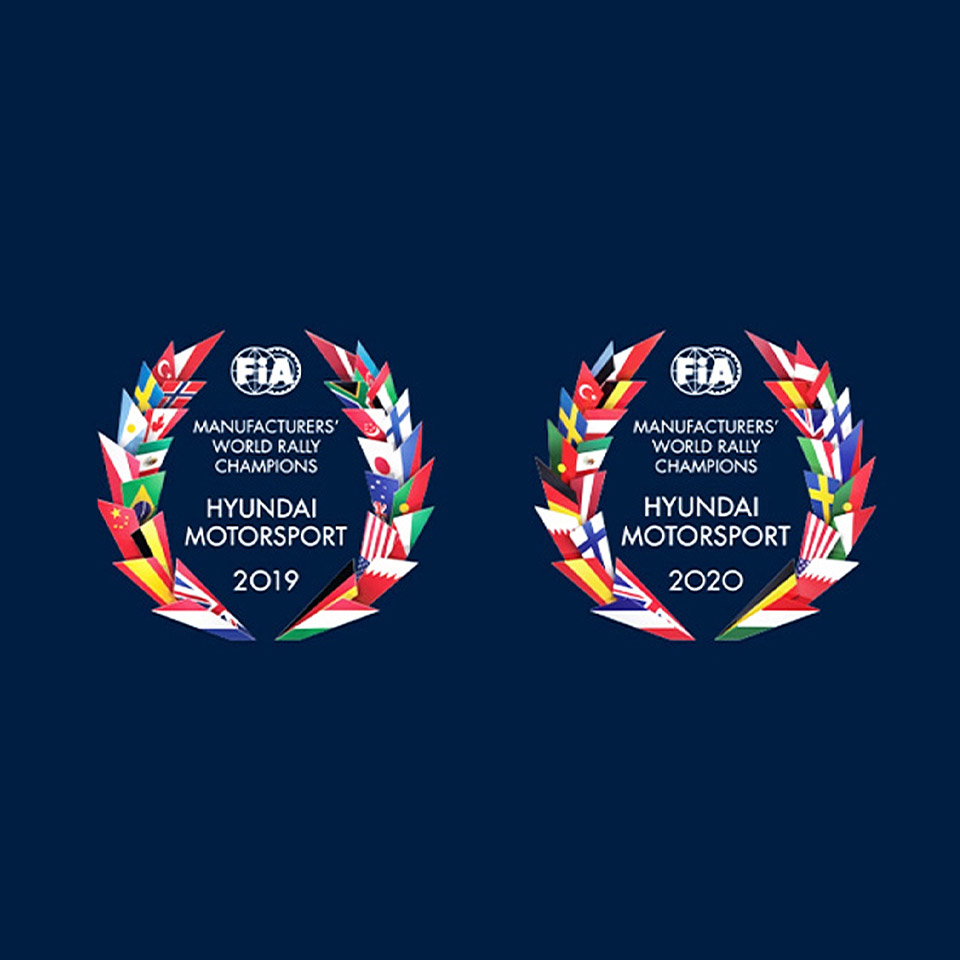


In the WRC, the world’s highest-tier motorsport competition, Hyundai Shell Mobis World Rally Team (hereafter Hyundai Team) just won their second straight manufacturer’s title. Even in a pandemic-truncated season of seven rounds, it requires a class of a champion to show consistent excellence throughout the season; every WRC rally comes with its unique driving conditions and its share of variables to meticulously prepare for, and even the most meticulous of preparations often require last-minute changes to meet the changes in circumstance. It goes without saying that those variables were more common this year amidst the frequent schedule changes.
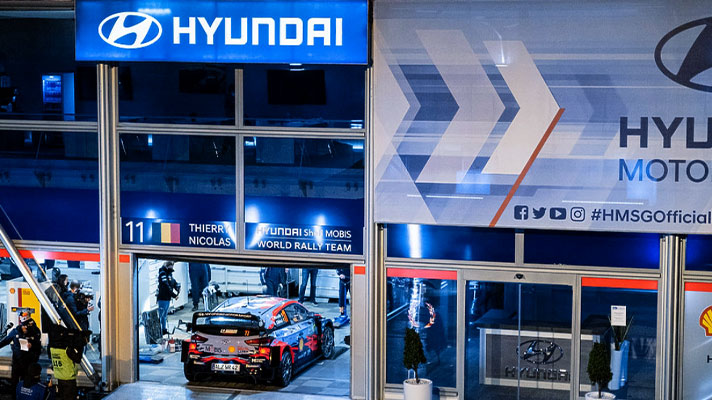
Two manufacturer’s titles in the seven years since the team’s return to the WRC in 2014 were of course a triumph for the team’s excellent drivers. But behind the podium and the spotlight lie the unsung heroes of the team’s consecutive title run―people of Hyundai Motorsport GmbH (HMSG), from the Head of HMSG Noh Seung-Wook, who has managed the organization to run like a close-knit family, to the Korean engineers who have developed the very rally cars in which the drivers raised their trophies.
And the list does not end there. The credit also goes to Hyundai’s research institutes in Korea and Europe that have supported motorsport R&D, as well as the Hyundai Motor Company’s affiliate divisions that have saved no effort in supporting HMSG’s WRC efforts. Joining us in this interview to represent those heroes were Noh Seung-Wook, Head of HMSG, Senior Research Engineer Park Tae-Wan, who is responsible for rally car body development, and Senior Research Engineer Hwang In-Gu, who is responsible for WRC and TCR rally car powertrain development.
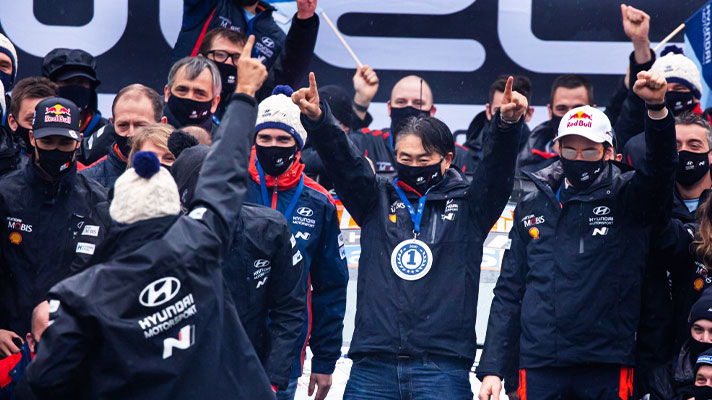
Q. This is the second title of your tenure as Head of HMSG. Could you give a few words about what this means to you?
The 2019 title was our first ever WRC title, and the title this year makes it two in a row. I cannot describe how happy I am. The ‘repeat’ just goes to show how much our organization has grown since its founding, and also demonstrates the stature the team enjoys at the moment in the competition.
Q. Due to the pandemic, this season has seen its schedule significantly truncated and altered. Every rally must have presented its challenges―how did you deal with them?
Covid-19 was one of the biggest variables this season. We had so many unpredictable schedule changes, which meant that we here at HMSG had to stay alert all the time to ensure that our drivers perform at 100%. Getting our drivers to participate in various local rallies in Europe for conditioning purposes was one product of such alertness that we maintained throughout the season.
Our driver rotations also allowed us some flexibility to deal with the contingencies. We had five drivers manning the three cars, and our aces Ott Tanak and Thierry Neuville participated in every rally to earn the most points possible, while the last man was chosen from the other three drivers on the basis of their respective strengths. I would say that this approach worked marvelously in helping us get the points to win the title.
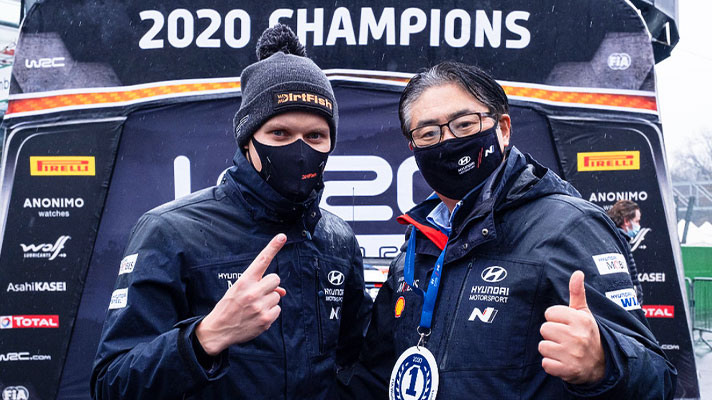
Q. During the pandemic-imposed hiatus, how did HMSG operate?
Covid-19 was raging in Europe, so we had members of our staff work from home in rotations. Divisions that did most of their work online, like Marketing/PR, Race Car Sales, and HR, were strongly encouraged to work from home. Our core engineers and mechanics who had to be physically present to prepare for the WRC committed to meeting our strict internal pandemic protocols.
Q. How do you normally interact with manager Adamo, the drivers, and other members of the team? As Head of HMSG, do you have a special way to keep the morale high?
Most of our interactions concern the WRC work, but if every interaction is purely professional, the organizational dynamic wouldn’t be as effective. I prefer a workplace where even intimate personal discussions are possible, a family-like environment if you will. So I try to be close with manager Adamo and our drivers even outside of the subject of racing, and as the head personnel of HMSG, I try to treat everyone as equals. I want every one of our members to feel respected.
The resulting close-knit teamwork from this approach makes our operations effective, particularly when we are met with a problem to solve during rallies. Then what you will see is an all-for-one, one-for-all concentration of efforts to fix the rally car and get it fully functional the next day. It’s a true display of our cohesion. We hope to maintain this solidarity and operate in a way that brings out the best of our team members.
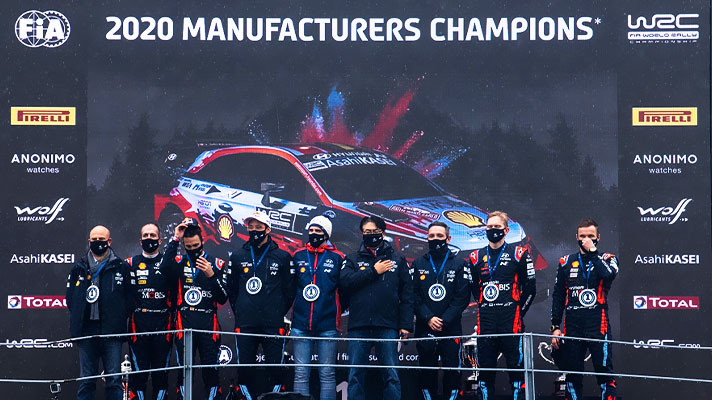
Q. HMSG is based in Germany and has a high percentage of foreign-born workers, but it is, ultimately, a part of Hyundai Motor Company. You must be proud to run a Korean organization performing extremely well on the world’s brightest stage.
Absolutely. HMSG directly represents Hyundai in the WRC and is simultaneously its foreign affiliate. In some sense, we feel we are representing not just Hyundai but the Republic of Korea. That certainly adds to our dedication. When we win a rally and have the Korean national anthem play over the podium, that’s when we feel really proud to be representatives of not just HMSG but our nation.
But let’s not limit our pride to just our national backgrounds. HMSG is a diverse organization with workers from many different countries, and our loyalty to and love for the organization and the team are shared by all of us. Every victory in the WRC is an equally prideful moment for HMSG teammates and Hyundai workers worldwide. That being said, the WRC is a global event, and winning there is a big shout-out for Korea as a nation. It gives you perspective beyond just adding another trophy to the trophy case.
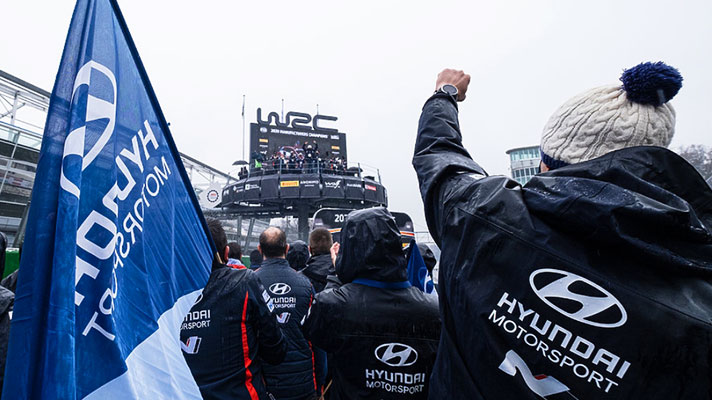
Q. Do you get the feeling that Hyundai’s images are changing due to its excellence in the WRC? Any specific episodes?
There weren’t any general audience in attendance this year because of the pandemic restrictions, but before that, yes, there were plenty of passionate voices in the stands that I could hear. You could just commonly see people in our team uniforms, shouting ‘Hyundai! Hyundai!’ as they wave our flags. I could tangibly feel just how much respect Hyundai commands now in the WRC.
What happens in the competition has meanings for marketing and PR. It’s easy to see WRC-driven marketing activities happening in the countries where rallies take place. When we reach out to potential consumers there, talking about our cars’ WRC-proven technological prowess, we can just feel that the name Hyundai means something more in their minds than it used to.
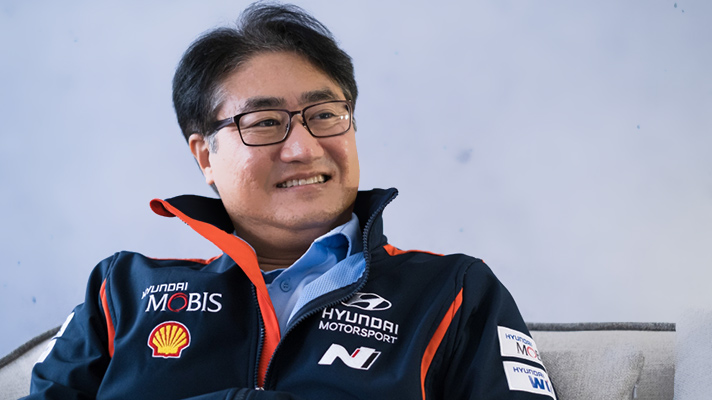
Q. Next year’s WRC season calendar is out. How are you planning for the next season?
The 2021 WRC season will include 12 rallies. It’s the last calendar year to battle it out with our existing WRC rally cars before a league-wide planned change to hybrid systems takes place in 2022. Since the performances of all rally cars from all teams should by default be at their peaks, we are expecting some fierce competition. We’re planning to actively invest in R&D to maximize our rally car performance under the current regulatory standards.
In addition, Croatia, Kenya, and Japan are being added as new events next year. It’s an unprecedented situation for every team, so the analysis of the course before the season begins is essential to maintain our competitive advantage. We’ll be as meticulous as possible in all those preparations to support the team not only in its third consecutive manufacturer championship but a driver championship as well.
Q. The year 2020 is coming to an end. Any parting words to the fans in Korea?
It was a tough year for everyone on Earth. We really appreciate everyone who has supported us in such dreary times. We may be physically apart from our fans, but spiritually we can feel their passionate support as if it’s happening close. We’ll be back next year to repay that love. Until the day when we can see each other face-to-face on the racetracks, I hope everyone is healthy and safe.
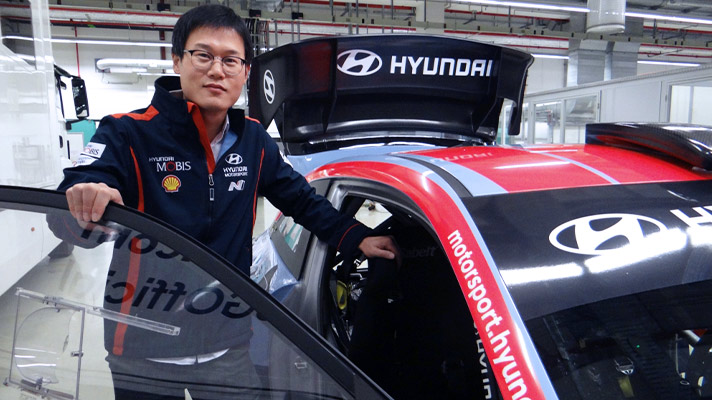
Q. When did you join HMSG? Could you share with us your motivation in joining the organization as well as your primary responsibilities?
Park Tae-Wan I used to work at Namyang Institute, developing high-performance vehicles and doing some collaboration with HMSG over rally car development. I became very interested in driving performance R&D at the time, and specifically, I wanted an environment where I could work to realize maximal driving performance across diverse terrains. That desire brought me to HMSG in 2017. Now I’m primarily responsible for engineering WRC rally cars―from designing to testing and production.
WRC rally cars are dependent on basic specifications of mass-produced models, so it’s essential that the models’ original engineers collaborate with HMSG’s motorsport engineers in seeking ways to improve rally car performance. Our collaboration with Namyang Institute renders our work more effective, but we also help the Namyang guys by sharing our motorsport know-how and R&D results, which can also be engineered into the brand’s mass-produced vehicles.
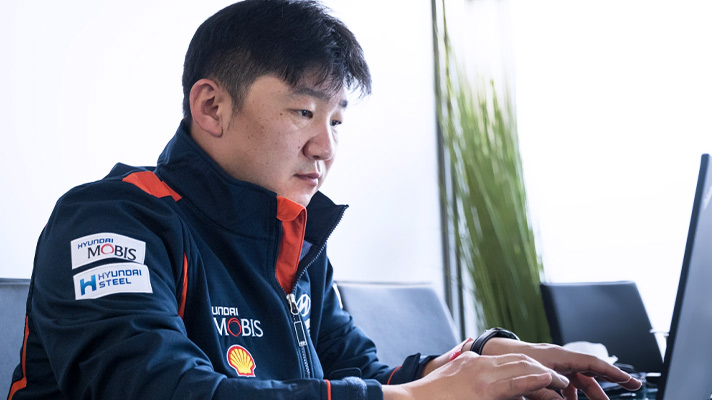
Hwang In-Gu | Before I started working at HMSG in 2018, I worked at Namyang Institute’s Powertrain Division, doing primarily engine performance development work. I had been working on preemptively developing WRC engines since 2012, and after HMSG’s establishment, I was assigned to collaborate with them on engine development. Like my colleague Tae-Wan, I joined HMSG as an expatriate employee to pursue my passion for rally car engine development.
In addition, the TCR race car on sale in HMSG’s Customer Racing Division is made with the engine that I have been working on since I was in Namyang. Now I’m working with HMSG engineers to improve this engine and facilitate communication and collaboration with our partner division at Namyang, the Performance Engine Development Part of the Engine Development Team. Incidentally, every year we host two technological exchange forums with Namyang to facilitate the internalization of motorsport engine technology.
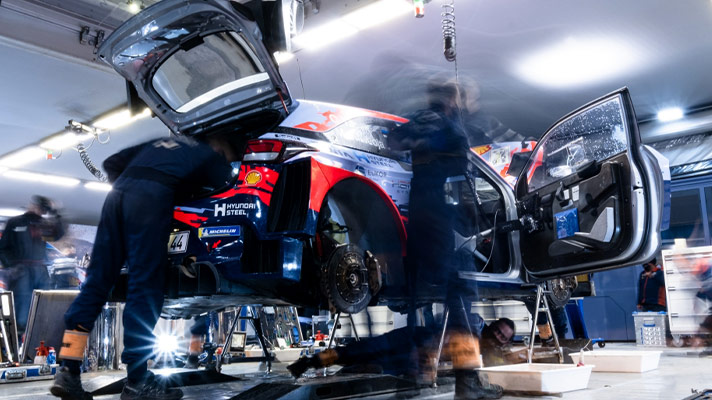
Q. Everyone at HMSG, I’ve heard, are ardent automobile and motorsport fans. Taking your favorite pastime as a career should have its pros and cons―how do you feel about working for your hobby?
Park Tae-Wan | HMSG workforce hails from 30 different countries, but one thing we have in common is a relentless passion for motorsport. We all want to develop the best rally car and contribute to team wins. This year’s schedule was rather irregular with the pandemic and all, but normally, the WRC is held once every three weeks in diverse nations with different conditions. So we must possess the capacity to develop a rally car that is optimized to the demands of every rally. In such a rigorous condition, I would say it absolutely helps to work with people who share the same goal of winning at motorsport’s top flight. There’s a synergy here, no question about it.
Q. Germany is home to some of the world’s best car manufacturers, parts producers, and tuners. I presume it is a great location for HMSG’s progress as a whole, not to mention your personal growth as an engineer. Is that so in your experience?
Hwang In-Gu | I’ve visited many powertrain conferences and exhibitions while here, and I’ve also collaborated with several parts manufacturers. People think that motorsport and mass-produced cars are just separate fields, but there are more similarities than meets the eye. German manufacturers very often use their know-how from motorsport on developing performance cars. HMSG does the same, in collaboration with Namyang Institute and Hyundai Motor Europe Technical Center, in developing performance cars of our own. We are going to strengthen this collaborative process to improve the fundamentals of not only our High-Performance N models but also our mass-produced models.
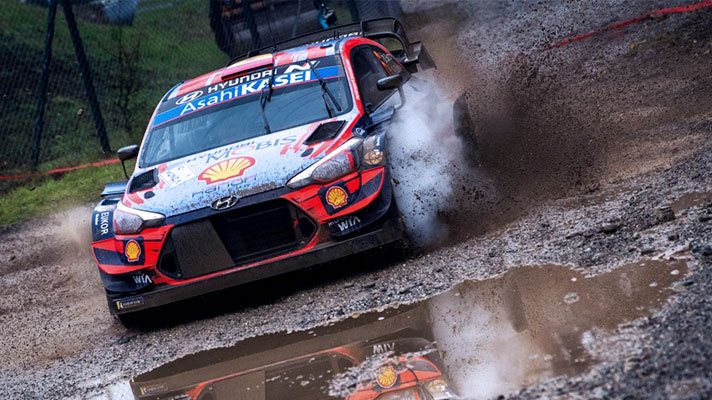
Q. The mass-produced i20 has gone through a generation change. Will the i20 WRC Rally Car be changed as well? If so, how?
Park Tae-Wan | Basically, the FIA updates its regulatory standards every three years, and all WRC rally cars are checked for compliance. In 2022, the next update on the rules will occur, including a change that mandates the inclusion of hybrid systems. Using the new i20 as the base model, we are working on developing a new i20 WRC Rally Car that will meet these new changes.
For the vehicle body, we are looking to install a new tubular chassis frame structure that strengthens the existing roll cage. That will allow us to create a safer and more extremely performance-oriented skeleton. We’re working on the suspension too, using our accumulated know-how on various surfaces to develop a suspension that allows more stable and faster driving. Also, we’re expanding the application of composite materials like carbon fiber reinforced plastic (CFRP) on vehicle body and doors. Doing so will make the new rally car not only be more lightweight but also carry a lower center-of-gravity, which we expect will lead to performance improvements.
Q. How are the preparations going for the advent of hybrid systems in the WRC in 2022?
Hwang In-Gu | Per FIA regulations, starting in 2022, all manufacturers will have to use the same hybrid systems supplied by a German company Compact Dynamics for three years. It’s the federation’s way of helping the manufacturers minimize the cost associated with developing hybrid systems from scratch.
But, when the hybrid system is installed, the engine, motor, and battery controls must be optimized again. The motor and battery controllers are supplied by the parts manufacturers, but the control logic between the new Hybrid Control Unit (HCU) and the existing Engine Control Unit (ECU) must be made anew. To that end, HMSG is collaborating with such partners as software development companies to develop an internal program that efficiently controls the engine and hybrid systems.
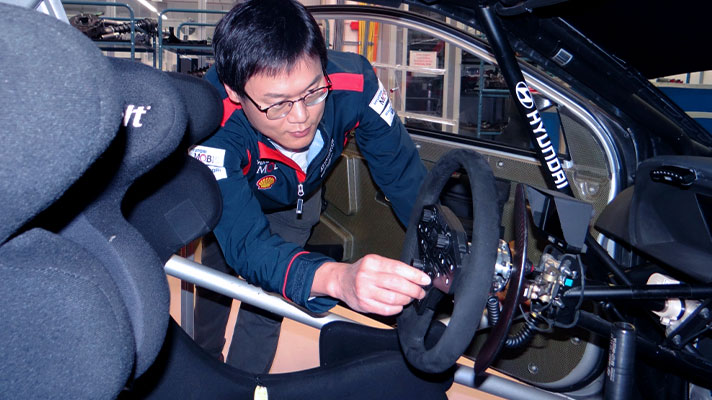
Q. Any personal aspirations while you’re in HMSG?
Park Tae-Wan | I’ve been here for four years. It’s a good time to look back and see if I have made good on my initial goals and to re-motivate myself to get set some new goals. Next year, I will be working on improving our WRC rally cars to support our third straight title run. And then the year after that, I will be working hard on designing a brand new rally car to stay ahead in the competition. When I go back to Namyang, I want to make sure that the experience I will have gained is enlightening enough to help me develop better mass-produced vehicles back home.
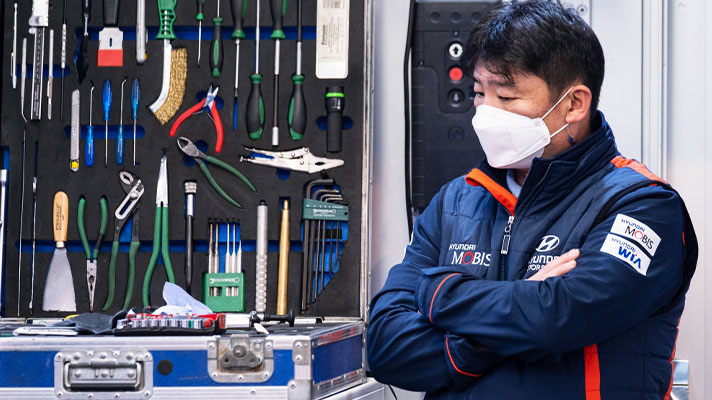
Hwang In-Gu | In the three years that I have been in HMSG, I witnessed the efforts of everyone at HMSG and Hyundai Motor Company culminating in a remarkable achievement of two straight manufacturer’s titles. Motorsport is a sport that requires the durability to withstand the extremes and the performance to outrun the competition. The WRC is motorsport’s unquestionable top flight. I have faith that my experience in the WRC will help in completing the mass-produced performance engine that the company is developing right now.
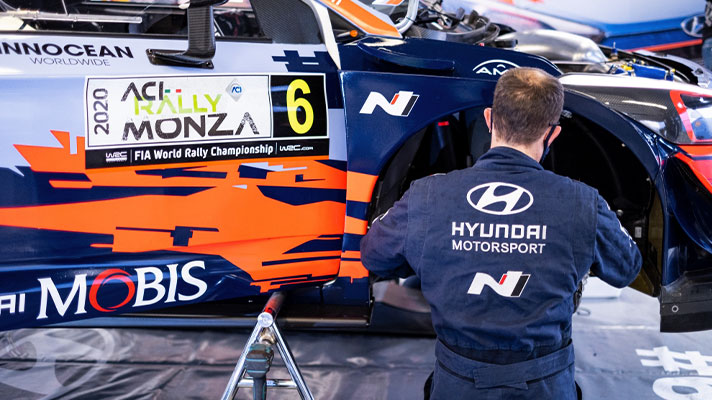
Q. Any advice for aspiring motorsports engineers who might be looking to follow in your footsteps?
Park Tae-Wan | Automobiles are an aggregation of a variety of complex technologies. And motorsport is what might be called the automotive industry’s technological spearhead―the reason why the sport is so popular in Europe, the home of the automobile, is that the Europeans have witnessed the sport’s huge impact on the advancement of automotive technology for the last hundred years. I believe this impact will not subside in the future; motorsport will continue to lead the industry’s development. If you love motorsport and love hands-on work, motorsport engineering is a promising line of career.
Hwang In-Gu | Motorsport engines are pretty different than mass-produced engines. Because the former is built with extreme performance and durability in mind, there aren’t as stringent budgetary limits. Driving in extremely rigorous conditions, as are commonly found in the WRC, often leads to unexpected and unpredictable problems. Seeking the solutions to these problems requires a passion for an endless search for knowledge. Teamwork is another important facet because motorsport is a team effort of managers, engineers, mechanics, and drivers. If you possess these characteristics, you have the makings of a fantastic motorsport engineer.
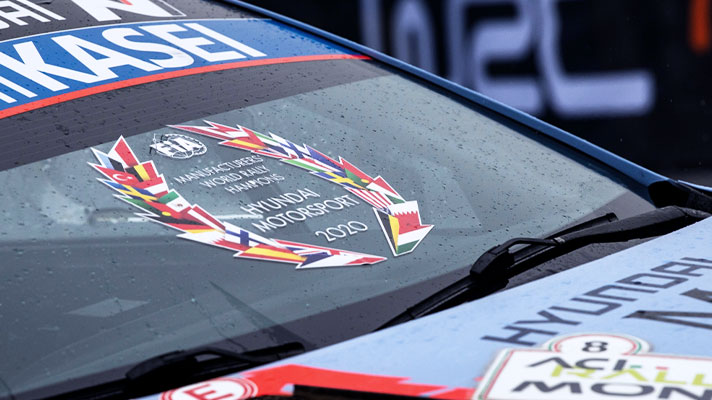
As demonstrated, the driving force behind the Hyundai Team’s consecutive titles was the hand-in-hand dash of HMSG members to the shared goal of a championship. The drivers manning the rally cars, the mechanics fine-tuning the cars in the workshop, the engineers bridging HMSG and the institutes to ensure the development of the finest rally cars, and the generous support from the Korean headquarters―all were essential ingredients in the teamwork that bore fruit in the last two years. As long as their synergy continues, Hyundai Team’s next goal in the WRC―a sweep of manufacturer’s and driver’s titles―appears completely feasible. It’s only a matter of time.